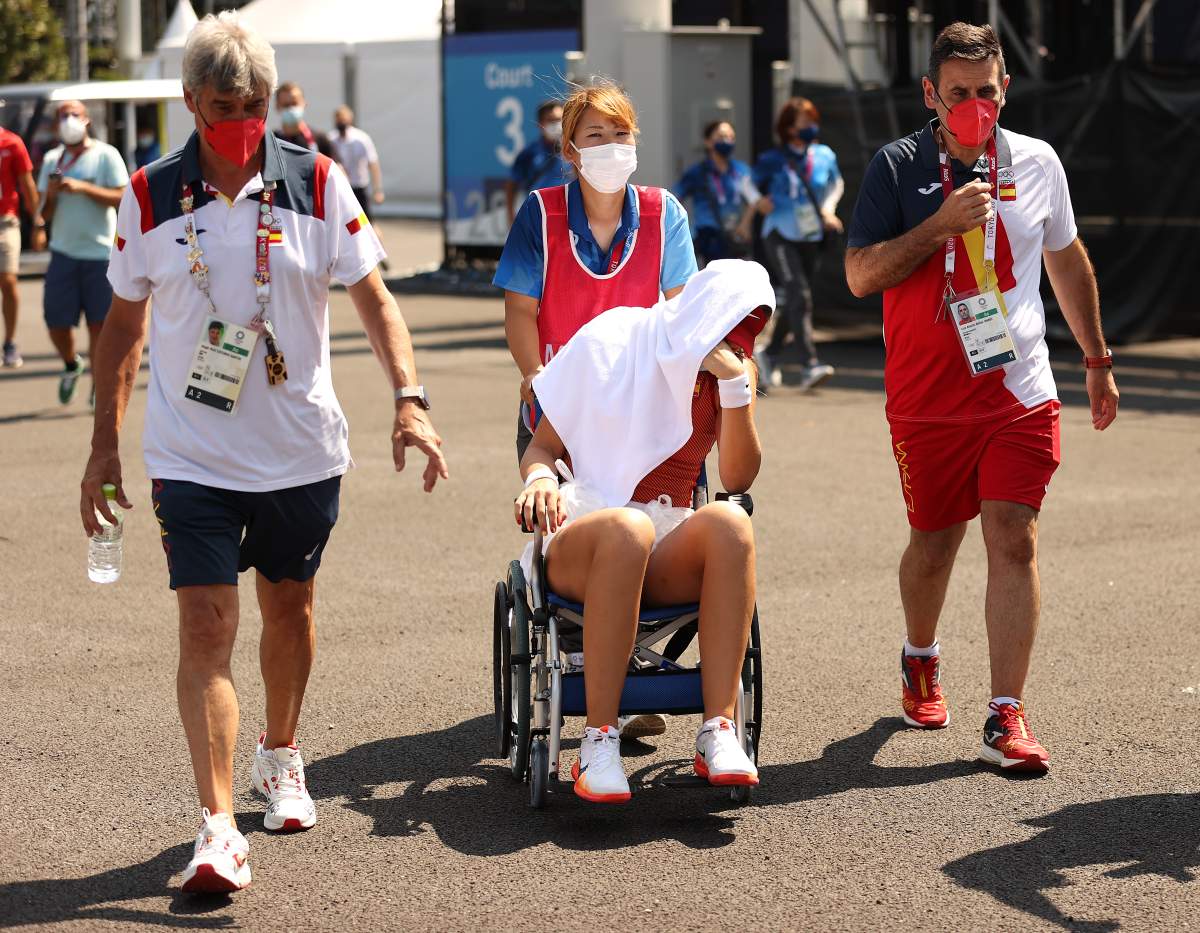Tokyo’s hot and humid weather is taking a toll on Olympians, who have to perform athletic feats at temperatures that would have most people wanting to crank up the A/C.

Spanish tennis player Paula Badosa quit her match Wednesday after suffering heatstroke, and had to be carried off the court in a wheelchair.
“It’s a shame to end my participation in this way. It’s been a tough ask since day one. We tried to adapt as best we could, but today my body hasn’t held up as it needed to,” said Badosa on Wednesday.
“I suffered heatstroke. … I didn’t feel like I could carry on with the game.”
Temperatures in the Tokyo area hit highs of 30 to 34 degrees Celsius every day this week, according to the Japan Meteorological Agency, not even counting the humidity. More over-30-degree weather is forecast for next week. What’s more, according to a blog post by NASA, all the cement and pavement in the Tokyo urban area turns the city into a “heat island,” making it feel even hotter on the ground.
Early on in the Games, a Russian archer fainted in the field due to the heat. Svetlana Gomboeva of Team ROC was treated for heat exhaustion at Yumenoshima Park Archery Field on Friday.
Another tennis player, Daniil Medvedev, complained of the heat Tuesday.
“Tennis needs to be considered as one of the endurance sports,” the 20-time Grand Slam winner said.
“I am playing tennis professionally for 20 years and I’ve never faced these kinds of conditions in my entire life on a consecutive daily basis.”
Second-ranked Medvedev opened proceedings on Ariake Tennis Park’s main show court against Italian Fabio Fognini. While he eventually advanced to the quarter finals, it took some doing.

Get breaking National news
The 25-year-old took a medical time out on court and called the trainer on two other occasions, and chair umpire Carlos Ramos asked Medvedev if he was alright during the second set.
“I’m fine. I can finish the match but I can die. If I die, will the ITF (governing body International Tennis Federation) take responsibility?” Medvedev replied.
The ITF’s “extreme weather policy” allows a 10-minute break between the second and third sets if agreed by both players and Medvedev used that time to get a freezing cold shower.
“Even from the first set, I didn’t feel good enough with my breathing. That’s why I called the physio — I felt like my diaphragm was blocked,” he said.
“And then in the second set, I just had darkness in my eyes, like between every point. I didn’t know what to do to feel better.”
Olympic organizers are prepared to deal with heatstroke, IOC medical director Richard Budgett said at a press conference. “For someone suffering from the heat, but it is not an emergency situation, we provide ice, shade, cold jackets.”
“We are working with some of the best experts in Japan, so if someone does suffer heatstroke, we can deal with it very quickly, but the main aim is prevention.”
Athletes from other sports are feeling the heat, too.
Swedish sailor Josefin Olsson said she’s drinking litres of water before her races to compensate.
“It ends up being a lot of litres. … You drink so much before and between the races that you’re almost ready to vomit,” she said.
“You’ve really got to be out in front when it comes to hydration. A race takes 50 minutes and we don’t drink anything during the race, so you really have to fill up before and between the races,” the 31-year-old said.
She said she also trained for the heat before arriving in Japan.
“We have a climate chamber in Stockholm and I did some days there before we came here, and I feel that I have the benefit of that now,” Olsson said. “It was actually tougher in the climate chamber than it is here, so it was very useful.”
Australian field hockey goalkeeper Andrew Charter said his water intake had risen fivefold from matches played in conditions less demanding than Tokyo’s.
“It’s 34 degrees, 80 per cent humidity, and then you throw all this gear on. That’s sitting at probably 44, 45 under it. It’s tough. But every goalkeeper’s got their own strategy out there,” he said.
For Charter, that means keeping a wet towel and ice water near his goal. “I’m probably drinking five litres of water in a game and it’s still not replacing it. It’s pretty big,” he said.
Planning for future Olympics
“When it comes to this combination between the temperature and the humidity, I have been warning that Tokyo is the worst in Olympic history,” said Makoto Yokohari, a professor on green urban planning at the University of Tokyo and advisor to the Tokyo Olympics.
Yokohari, who has analyzed data back to the 1984 Olympics in Los Angeles, urged the organizers of the next summer Olympics — Paris in 2024 — to act early and address potential challenges.
France saw record heatwaves in 2019, with temperatures jumping to a high of 46 Celsius, causing about 1,500 deaths.
“If that happens again, … then I’m sure the situation in Paris (in 2024) will become even worse than Tokyo,” Yokohari said.
The IOC said in emailed comments to Reuters that it would take into account “flexibility and adaptation to the consequences of climate change” in planning future events.
— with files from Reuters













Comments
Want to discuss? Please read our Commenting Policy first.